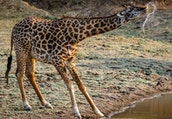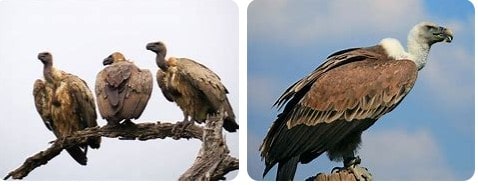- There are several species of vultures found in Africa, including the African white-backed vulture (Gyps africanus), the Cape vulture (Gyps coprotheres), the Rüppell's griffon vulture (Gyps rueppelli), the hooded vulture (Necrosyrtes monachus), and others.
- Vultures inhabit a variety of habitats, including savannas, grasslands, and open woodlands. They are often associated with areas where large herbivores, and thus potential carcasses, are abundant.
- Vultures are scavengers and feed primarily on carrion (the flesh of dead animals). Their powerful beaks and specialized digestive systems allow them to consume a diet that may include diseased or rotting meat without adverse effects.
- 4. Vultures Social Behavior: Vultures are social birds that often gather in large groups, known as a wake or committee, especially when feeding on a carcass. They have keen eyesight, enabling them to spot carrion from high altitudes during flight. 5. Vultures Nesting and Reproduction:
- Vultures typically build their nests in trees, cliffs, or on the ground, depending on the species. Breeding pairs may form long-term bonds, and females usually lay one or two eggs in a breeding season.
- 6. Vultures Conservation Status: Vultures are facing significant threats, and many species are in decline. These threats include poisoning (often unintentional through the consumption of poisoned bait intended for predators), habitat loss, and reduced availability of carrion. Several African vulture species are listed as "Endangered" or "Critically Endangered" on the International Union for Conservation of Nature (IUCN) Red List.
- 7. Vultures Importance in Ecosystems: Vultures play a crucial ecological role in cleaning up and recycling nutrients from animal carcasses. Their presence helps prevent the spread of diseases by quickly removing and consuming dead animals. The decline in vulture populations can have cascading effects on ecosystems, leading to an increase in scavengers like feral dogs and a higher risk of disease transmission.
- 8. Vultures Cultural Significance: Vultures have cultural significance in some African societies. They are often associated with death and the afterlife in traditional beliefs. In certain cultures, vultures are considered sacred or are believed to have spiritual significance.
- 9. Vultures Conservation Efforts: Conservation organizations are working to address the threats facing vultures, including initiatives to reduce poisoning incidents, habitat conservation, and community engagement. Captive breeding programs are also being implemented to bolster populations of critically endangered vulture species.
- 10. Vultures Tourism and Observation: Vultures are commonly observed in wildlife reserves and national parks in Africa. Their impressive soaring flights and congregation at carcasses make them a fascinating sight for wildlife enthusiasts.
Africa Vultures
Vultures are important scavengers in African ecosystems, playing a crucial role in the natural disposal of carcasses and helping to prevent the spread of diseases. Here are key details about vultures in Africa:
Africa Safari Tour Book online Witnessing the wildebeest herds on their epic journey is not only a thrilling safari adventure but also a humbling reminder of the beauty and complexity of the African wilderness.
1. Vultures Species:
2. Vultures Habitat:
3. Vultures Feeding Habits:
Remember that vultures play a crucial role in maintaining the ecological balance by scavenging on carrion. Observing them in their natural habitat can be both educational and rewarding. Be sure to approach birdwatching with respect for the wildlife and their habitats, following ethical guidelines to minimize disturbance.
Africa Zebra Safari Tour
An Africa Zebra safari tour offers an incredible opportunity to witness and photograph these iconic black and white-striped animals in their natural habitat. Zebra sightings are common in many African safari destinations, especially in areas where they roam freely in diverse landscapes.
By planning ahead and choosing reputable safari operators or guides, Zebras are captivating animals, and observing them in their natural environment is a memorable experience. Their striking appearance, social behaviors, and interactions with other wildlife make them an integral part of the African safari experience.
Here are some key points to consider when planning an Africa Zebra safari tour:
Africa Zebras Safari Destinations
Safari Destinations: Zebras are found in various countries across Africa, making them a common sighting in numerous national parks and game reserves. Some of the best safari destinations for observing zebras include:
- Kenya: Maasai Mara National Reserve, Amboseli National Park, Tsavo National Parks, and more.
- Tanzania: Serengeti National Park, Ngorongoro Crater, Tarangire National Park, and other northern circuit parks.
- South Africa: Kruger National Park, Hluhluwe-iMfolozi Park, Addo Elephant National Park, and others.
- Botswana: Chobe National Park, Moremi Game Reserve, and Okavango Delta.
- Namibia: Etosha National Park, Namib-Naukluft National Park, and others.
1. Africa Zebra Timing
Timing: The timing of the migration varies each year, as it is dependent on rainfall and the availability of fresh grazing. Generally, the wildebeests start moving north from the Serengeti to the Maasai Mara around July and return to the Serengeti around October. However, these timings can fluctuate, so it's essential to plan your safari accordingly.
2. Africa Zebra Game Drives and Walking Safaris
Game Drives and Walking Safaris: Participate in guided game drives or walking safaris led by experienced guides who are knowledgeable about the behavior and ecology of zebras. Game drives provide an opportunity to encounter zebras and other wildlife up close, while walking safaris offer a more intimate and immersive experience in the African wilderness.
3. Africa Zebra Behavior
Zebra Behavior: Observe zebras in their natural behaviors, such as grazing on grass, interacting with their herd members, and running in their distinctive zigzag pattern when startled. The social dynamics of zebra herds can be fascinating to witness.
4. Africa Zebra Wildlife Diversity
Wildlife Diversity: While on your zebra safari, you will encounter a wide variety of other wildlife, including lions, elephants, giraffes, wildebeests, and a plethora of bird species. Africa's diverse ecosystems offer an incredible range of animal and plant life.
5. Africa Zebra Photography Opportunities
Photography Opportunities: Bring a camera with a zoom lens to capture the impressive zebra sightings and other wildlife encounters. Zebras' unique coat patterns and behaviors provide excellent subjects for wildlife photography.
6. Africa Zebra Responsible Tourism
Responsible Tourism: Choose safari operators and lodges that prioritize responsible and sustainable tourism practices, ensuring the well-being of wildlife and the preservation of the environment.
7. Africa Zebra Great Migration
Great Migration: If timing permits, consider planning your safari during the Great Wildebeest Migration in the Serengeti-Mara ecosystem, where zebras and wildebeests undertake one of the most significant wildlife migrations on the planet.








 |
|  |
|  |
|  |
| 